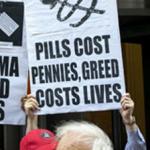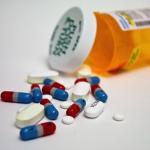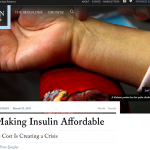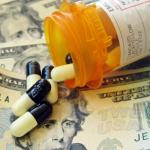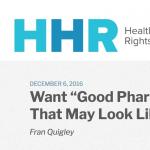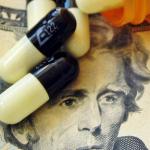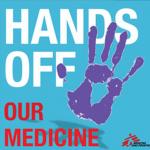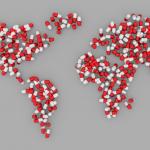During the January 2003 State of the Union address, President George W. Bush announced the President’s Emergency Plan for AIDS Relief, a landmark treatment program. As Bush spoke, the cameras panned to a smiling guest of honor standing to the right of First Lady Laura Bush. The guest was Ugandan physician Dr. Peter Mugyenyi, and he was an illegal importer of medicines.
Recognizing that access to essential medicines is a moral imperative, the mission of People of Faith for Access to Medicines is to achieve medicines availability as a fully-realized human right. Every child who needs a vaccine should receive it, as should every parent who needs cancer medicines. In pursuing that goal, we are following the lead of long faith and moral traditions and well-settled human rights law.
James Elliott is convinced that the statistics describing the prevalence of type 1 diabetes are misleading. “People say that there is little or no type 1 diabetes in poor countries,” he says. “But that is because all of the people who had it are dead.”
The constant onslaught of news is destabilizing: Immigrants are at great risk of being uprooted from their families. The social safety net, especially access to the basic need of healthcare, is under threat. Aggressive, warlike messages are issued from the highest level of our government.
“OK, but tell us what we would replace it with.”
The response in the online comments section following one of my articles on access to medicines may have been a bit curt, but the point was well-taken. Virtually no one who is not a pharmaceutical corporation CEO likes the current medicines system, with its ever-climbing prices causing deadly access barriers. But the question remains: are medicine patent monopolies and the resulting high patient costs a necessary evil?
The pharmaceutical industry has a massive public relations problem, and it knows it. Even an unapologetically pro-corporate President says drug companies are “getting away with murder.” Americans name prescription drug prices as a top concern, and a January poll showed only 9% of people in the U.S. feel that those companies prioritize patients over profits.
When it comes to providing access to medicines, and access to healthcare overall, we in the U.S. can do much, much better than the Affordable Care Act.
First, let’s give credit where credit is due: the Affordable Care Act represents an improvement in the shameful state of affairs that preceded it. Thanks to the ACA’s expansion of Medicaid and subsidies in health insurance “Marketplaces,” millions of people now have coverage that did not have it before.
Last week’s blog post from People of Faith for Access to Medicines focused on the need for our advocacy to appeal to the heart, not just the head. There is no surer path to the hearts of the public, and even lawmakers, than stories of real people affected by our medicines crisis.
Last week, William Easterly, a high-profile global poverty expert and professor of economics at New York University, published an article in Foreign Policy called, “Democracy is Dying as Technocrats Watch.”
In the article, Easterly cited the success of Donald Trump’s disturbing rhetoric and a documented global decline in support for democracy. He laid the blame on “technocracy” being an inadequate response to emotionally-charged messaging.
In the interview that accompanied President-elect Donald Trump’s Time magazine Person of the Year story, he said, “I’m going to bring down drug prices. I don’t like what has happened with drug prices.”
If you don’t find yourself agreeing with Trump very often, you may have finally found common ground. As the man said, there is a lot not to like.
Are cleverly-branded fishing hats, stuffed animals, and fancy dinners to blame for the U.S.’s raging opioid and heroin epidemic?
Most of us know the breathtaking scope of that epidemic. People are dying of overdoses at a higher rate than ever in our history, nearly 80 deaths every single day. With four of every five heroin users tracing their addiction back to opioids, many of us likely know a loved one or neighbor touched by this tragedy.
The long list of complaints about the current system of medicine access and pharmacological research is well-known and well-documented, including in the Health and Human Rights Journal.
Those complaints start with patients facing significant—often deadly—pricing barriers, in low-income and high-income countries alike. The pharmaceutical companies that set those prices have been fiercely criticized for benefitting from publicly-funded research and then leveraging resulting patent monopolies to achieve profit margins that are the envy of other industries.
Dating well back before Sister Catherine Sienna drummed it into our heads at Immaculate Heart of Mary elementary school, I knew that I was commanded to love both my neighbor and my enemy. The instruction I received referenced the Gospels of Mark and Matthew . But similar decrees come from the Torah , the Koran , and other sacred texts.
When I think of pharmaceutical corporations, I reflect on these obligations. I particularly think about them when I run across news of Eli Lilly and Company.
While the 2014 Ebola crisis was raging in West Africa, Gregg Gonsalves, co-director of the Yale Global Health Justice Partnership, gave a sad-but-accurate diagnosis of the state of global health concerns in the U.S. “Exotic infections for Americans, often from far away places, often Africa, strike fear into their hearts,” Gonsalves wrote. ”But only once the pathogens have cleared customs.”
Tobeka Daki died this week. And she shouldn’t have.
Tobeka lived in the Eastern Cape of South Africa, and was the mother of two sons. Her youngest son, Khanya, is 11 years old. In 2013, she was diagnosed with a strain of breast cancer known as HER2. There is a medicine called Trastuzumab, marketed under the name Herceptin, that is very effective at treating Tobeka’s form of breast cancer. The groundbreaking research that led to the discovery of Herceptin was funded by U.S. taxpayers. A year’s dose can be manufactured for about $176.
But Tobeka was never treated with Herceptin. The corporation that controls the medicine charges about $34,000 in South Africa for a year’s worth of doses.
Like everyone else in the U.S. and beyond, access to medicines advocates are trying to figure out just what the impact will be from last week’s surprising election results.
No one knows for sure, but it seems there is some bad news and some good news, and plenty of activism opportunities ahead...
Every faith and moral tradition embraces the principle that no human being should suffer without access to the care they need. For that reason, the faith community’s position on the Trans-Pacific Partnership should be clear: it must be rejected.
In addition to the TPP’s likely harmful impact on workers and our environment, this trade agreement would seriously undermine access to lifesaving medicines. As readers of this blog already know, millions of people in TPP countries, including here in the U.S., already struggle to afford the cost of the medicines they need.
Does the upcoming U.S. election matter to the cause of access to medicines?
The correct answer is “Yes, but . . .”
The answer is yes, because the U.S. President and members of Congress are enormously influential on access to medicines policy. Clearly, this is true in the U.S., with the prospect of potential changes in 2017 to Medicare drug pricing and discounts to governments on drugs discovered with taxpayer dollars.
In the language of our faith and moral traditions, there is no shortage of commitment to social justice.
All major religious traditions set out a clear mandate to provide for the needs of the poor and sick, and to go beyond mere charity to also work for justice and the fulfillment of human rights. Old Testament prophets and Jesus Christ spoke in terms of justice. The Quran invokes justice, and Confucian principles embrace a community-wide obligation to provide for the needs of all.
More importantly, people of faith have often embraced those calls to action, and in so doing helped make the world a better place. When it comes to reversing the dismal state of access to essential medicines, there is every reason to believe we can do so again...
Have you heard the old saying that, if you look around a poker table and can’t figure out who is the sucker, then the sucker is you?
When it comes to the current medicines system, it is time for us taxpayers to take a good look: we are the suckers in this game. Taxpayers pay for the research to discover medicines we need, which is great. What is not great is that we then hand over monopoly rights to those medicines to corporations, which turn around and charge us taxpayers and our governments sky-high prices for the very same medicines we paid to discover.

